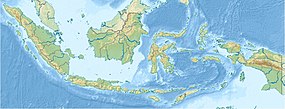Opak River
| Opak River Sungai Opak, Kali Opak | |
|---|---|
 Opak River as viewed from Jetis, Bantul | |
| Location | |
| Country | Indonesia |
| State | Yogyakarta |
| Region | Bantul Regency, Sleman Regency |
| Physical characteristics | |
| Source | Mount Merapi |
| Mouth | |
• location | Indian Ocean |
| Length | 65 km (40 mi) |
| Basin size | 638.89 km2 (246.68 sq mi) |
Opak River is a river in central south area of Java island, Indonesia.[1]
Hydrology
It flows from its source on the slopes of Mount Merapi in the north, heading southward and passes the west side of 9th-century Prambanan temple compound, located to the east of Yogyakarta and southeast of Kota Gede.
It also passes the historical locations of Plered, Karta, and Imogiri before draining into the Indian Ocean in the southern part of Bantul.
The river runs upon Opak tectonic fault, a major tectonic fault in southern Central Java responsible for major earthquakes in the region..
The river basin that it lies in is significant as the aquifer is in a heavily populated part of Java [2] One of the tributaries is Oyo River.
Geography
The river flows in the southwest area of Java with predominantly tropical monsoon climate (designated as Am in the Köppen-Geiger climate classification).[3] The annual average temperature in the area is 22 °C. The warmest month is October, when the average temperature is around 26 °C, and the coldest is January, at 18 °C.[4] The average annual rainfall is 2970 mm. The wettest month is January, with an average of 537 mm rainfall, and the driest is September, with 22 mm rainfall.[5]
Gallery
- Prambanan temple on the east bank of Opak river.
- View on the Opak River. S.M. Java.
- A boat crossing the Opak River.
- Opak River's bank.
See also
References
- ^ Kali Opak at Geonames.org (cc-by); Last updated 2013-06-04; Database dump downloaded 2015-11-27
- ^ Purnama, Setiawan; Suyono, Suyono; Sulaswono, Budi (2007), SISTEM AKUIFER DAN POTENSI AIRTANAH DAERAH ALIRAN SUNGAI (DAS) OPAK Aquifer System and Groundwater Potency of Opak River Basin, forum geografi, retrieved 5 March 2014
- ^ Peel, M C; Finlayson, B L; McMahon, T A (2007). "Updated world map of the Köppen-Geiger climate classification". Hydrology and Earth System Sciences. 11 (5): 1633–1644. Bibcode:2007HESS...11.1633P. doi:10.5194/hess-11-1633-2007. Retrieved 30 January 2016.
- ^ "NASA Earth Observations Data Set Index". NASA. 30 January 2016.
- ^ "NASA Earth Observations: Rainfall (1 month - TRMM)". NASA/Tropical Rainfall Monitoring Mission. 30 January 2016.
External links
Further reading
- (In Indonesian with English summaries) Sunarto Drs (2000), Studi geografi pertumbuhan bura dengan acuan pranata mangsa pada muara Sungai Opak dan Progo, Daerah Istimewa Yogyakarta : laporan penelitian, Lembaga Penelitian, Universitas Gadjah Mada, Departemen Pendidikan Nasional, retrieved 13 April 2012






